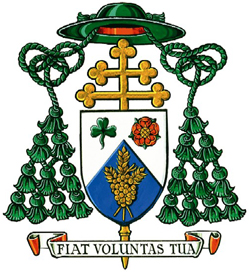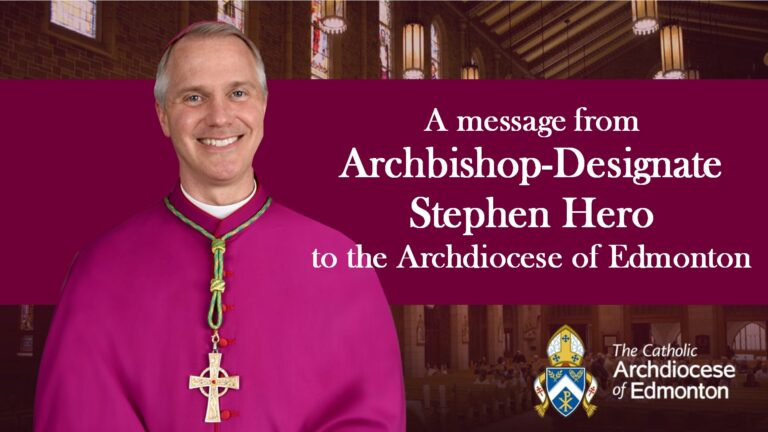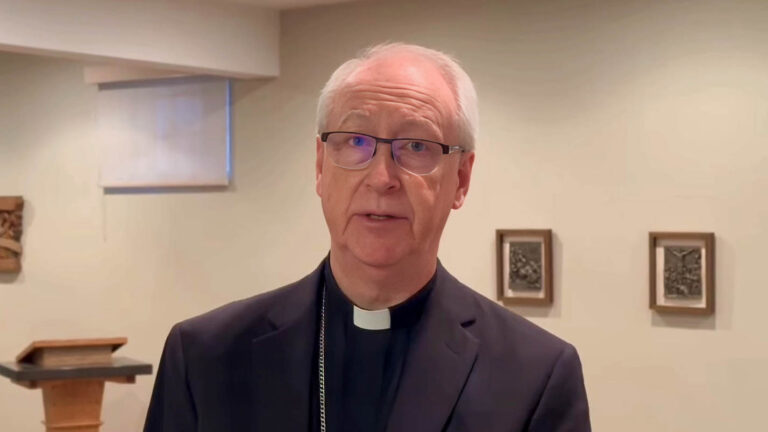Homily
[Isaiah 22:15, 19-23; Psalm 138; Romans 11:33-36; Matthew 16:13-20]
For the past number of months, we have been experiencing rather dramatic climate events, both here in Alberta and elsewhere nationally and globally, such as: high winds, at times occasioning tornados; torrential rains with dangerous flooding; widespread and terrifying wildfires. Our response to these has included sheltering in place, the evacuation of homes and businesses, or actually engaging the danger with experts in weather forecasting, flood diversion, or firefighting.
To enter into the message of God’s Word today, I invite us to consider how the Church finds herself situated within climate change of a different order. We are experiencing “changes in the atmosphere” brought about by belief systems antithetical to Christian faith. One can think, for example, of the prevailing winds of radical secularism, the inundation of moral relativism, or the fires set alight by harmful ideologies. Here, too, we ask how to respond. Should we shelter in place, keeping our faith private; are we tempted to evacuate our home, the Church, as something no longer in step with the times; or do we actively face the situation by engaging our culture with the truth and beauty of our faith?
With this in mind, let us turn to the text from the Gospel of Saint Matthew. It opens with a situation of climate change. Jesus and his disciples enter the region of Caesarea-Philippi. In doing so, they move into an area where the atmosphere is very different from that to which they are accustomed. It is marked by the worship not of the God of Israel but of pagan deities. In other words, Jesus takes his disciples deliberately to a place where the environment was shaped by beliefs antithetical to their own, much as our experience is today. It is precisely here, in this setting of unfamiliar and menacing “climate change”, that Jesus poses the question of his identity: “Who do people say that I am? Who do you say that I am?” Note carefully that he does so openly, in public. Famously, Peter makes the confession of faith in Jesus as the Son of the living God, and also does so publicly. In this open dialogue between Jesus and Peter we have the answer to our question as to how we respond to the atmospheric changes around us. Retreat or evacuation is not an option for the disciple of Jesus Christ. Our call is to engage the culture, especially when the climate is threatening, with our public announcement of the true identity of Jesus Christ.
Everything hinges on this. Consider the answers that the disciples first give to the question posed by Jesus. “Some say John the Baptist, but others Elijah or one of the prophets.” Let’s not miss that these are all wrong answers. And wrong answers continue to be given to the question of Jesus Christ, publicly. Some say he was just a good man. Others say he only gave us good example to follow, while still others pronounce him an effective teacher. For many people, the answer is complete indifference, as they do not even consider him at all. When our world does not accept the right answer, the truth that Jesus is Son of God and Saviour of the world, then our own presumption takes over and we are governed not by the Lord but by the product of our own thinking. You know, we often hear questions posed as to the cause of the changes we see unfolding in our environment – how much of this is due to human activity, such as the emission of carbon into the atmosphere; how much is due to cyclical changes that occur naturally over time? Well, when it comes to the shifting “weather patterns” of the mind, the atmospheric trends causing great suffering for the human soul, the cause is entirely man-made: failure to acknowledge and receive the truth that Jesus is the Christ, the Son of the living God.
Clearly, then, the public affirmation of our faith in Christ is of great consequence for the life of the world. So, we want to be sure that we ourselves get the answer right, that we do not inadvertently convey the wrong answers. This brings me to Peter the rock. Once the Father reveals to Peter the truth to be confessed concerning his Son, Jesus establishes him as the rock of his Church, the one charged to lead the community of believers by both confessing and preserving the true answer to the question of Jesus Christ. This ministry, as we know, has been handed on in the subsequent history of the Church to the Successor of Saint Peter, the Pope. This means that, by remaining in communion with the Holy Father’s preservation of the Gospel, disciples of the Lord Jesus can have confidence that we are engaging the climatic forces of confusion, division, persecution, and so on with the right answer concerning his identity. By the will of the Lord Jesus himself, we look to Peter the rock, in the person of the Pope, to remain rock-solid ourselves in the confession of right faith in Jesus Christ.
As our brave first responders and emergency officials struggle against the destructive forces of wind, water, and fire, I can well imagine moments of frustration and perhaps fear whenever they see those powers strengthen and spread. We can experience similar despondency when we see atmospheric forces inimical to the faith gather strength and grow in ferocity. In such moments, the Gospel for today reminds us of the promise Jesus made to Peter as he established the Church, namely, that “the gates of Hades will not prevail against it.” Living in the strength of this promise, we recognize, then, that these are moments not for fear but for doubling down on our affirmation of the supremacy and power of the love of Jesus.
In our mass this morning, may the grace of the Eucharist deepen our confidence in this promise of the Lord, so that, in communion with the faith of Peter, we may joyfully and eagerly share with the people of this present climate, however threatening, our confession that Jesus, and none other, is the Christ, the Son of the living God.
Most Reverend Richard W. Smith
Saint Joseph Basilica
August 27th, 2023



